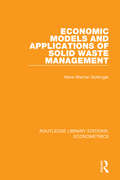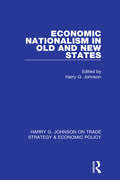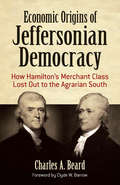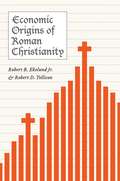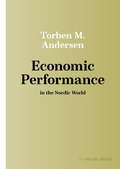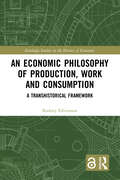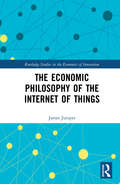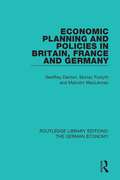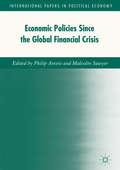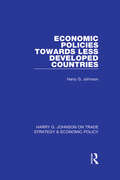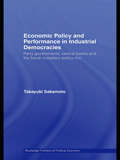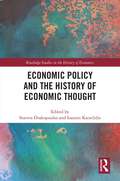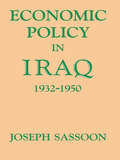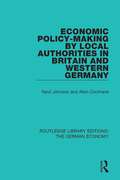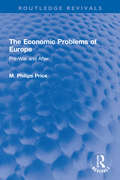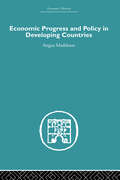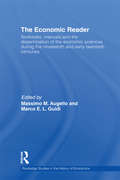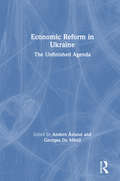- Table View
- List View
Economic Models and Applications of Solid Waste Management (Routledge Library Editions: Econometrics #6)
by Hans-Werner GottingerOriginally published in 1991. The dilemma of solid and hazardous waste disposal in an environmentally safe manner has become a global problem. This book presents a modern approach to economic and operations research modelling in urban and regional waste management with an international perspective. Location and space economics are discussed along with transportation, technology, health hazards, capacity levels, political realities and the linkage with general global economic systems. The algorithms and models developed are then applied to two major cities in the world by way of case study example of the use of these systems.
The Economic Modernisation of France (Routledge Revivals)
by Roger PriceFirst published in 1975, The Economic Modernisation of France presents the study of economic developments in France between 1730 and 1880. This period is conceived as one of growth in production within pre-industrial economic structures, succeeded from 1840-50 by rapid structural transformation and the creation of an industrial economy. Divided into four major parts it discusses themes like communication and the development of commerce; agriculture; industrial development; and population. Rich in primary sources, this will be an essential read for scholars and researchers of French history, European history, economic history, and history in general.
Economic Nationalism in Old and New States (Harry G. Johnson on Trade Strategy & Economic Policy #2)
by Harry G. JohnsonOriginally published in 1968, this book brings together contributions from social scientists in anthropology, economic history, economics and political science in an exploration of the nature and effects of economic nationalism. The opening essays presents a formal theory of nationalism that relates the phenomenon to rational government processes. Following chapters explore whether nationalism and economic development went together and whether nationalistic economic polices actually promoted development. How far British economic policy was influence by nationalism, or its corollary for a successful country-imperialism is also assessed. Examples from China, Mali, Mexico and Canada are included.
Economic Origins of Dictatorship and Democracy
by Daron Acemoglu James A. RobinsonThis book develops a framework for analyzing the creation and consolidation of democracy.
Economic Origins of Jeffersonian Democracy: How Hamilton's Merchant Class Lost Out to the Agrarian South
by Charles A. Beard Prof. Clyde W. BarrowThe sequel to the bestselling An Economic Interpretation of the Constitution, this volume focuses on the nation's early political history from the adoption of the Constitution through the end of the Jefferson administration. This period saw the rise and triumph of Jefferson's agrarian, slave-holding South over the mercantile-oriented urbanism of Hamilton's North, setting the stage for the ongoing clash between rural and urban America, a topic still highly relevant in the twenty-first century. Beard defines the early period of American governance in terms of the conflict between agrarianism and fluid capital that dominated the campaign for the ratification of the Constitution. He traces this dispute across three decades into its manifestations as Federalism versus Republicanism and later into Federalism and Jeffersonian Democracy. Broad in scope, Beard's view places the struggles within the context of social and cultural developments, and his interpretation provides an excellent resource for students of the historical background of American politics.
Economic Origins of Roman Christianity
by Robert D. Tollison Robert B. Ekelund Jr.In the global marketplace of ideas, few realms spark as much conflict as religion. For millions of people, it is an integral part of everyday life, reflected by a widely divergent supply of practices and philosophical perspectives. Yet, historically, the marketplace has not always been competitive. While the early Common Era saw competition between Christianity, Judaism, and the many pagan cults, Roman Christianity came eventually to dominate Western Europe. Using basic concepts of economic theory, Robert B. Ekelund Jr. and Robert D. Tollison explain the origin and subsequent spread of Roman Christianity, showing first how the standard concepts of risk, cost, and benefit can account for the demand for religion. Then, drawing on the economics of networking, entrepreneurship, and industrial organization, the book explains Christianity's rapid ascent. Like a business, the church developed sound business strategies that increased its market share to a near monopoly in the medieval period. This book offers a fascinating look at the dynamics of Christianity's rise, as well as how aspects the church's structure--developed over the first millennium--illuminate a number of critical problems faced by the church today.
Economic Performance in the Nordic World (Nordic World)
by Torben M. AndersenThe Nordic countries stand out in international comparisons for having both high living standards and low inequality. The welfare state and public sectors are large and the tax burden is high. How have these countries managed to achieve such favorable economic performance? Economist Torben M. Andersen shows how the Nordic model rests on two pillars: the social safety net, which offers income compensation to the majority of those unable to support themselves, and the provision of services like education, childcare, and healthcare to all. The Nordic model can be characterized as one of employment, since its financial viability rests on a high labor participation rate with few working poor. Andersen lays out the structure of the model and highlights factors important for understanding its economic performance. He then looks into specific policy areas based on Denmark's experiences regarding labor market policies (flexicurity), pension systems, and preparation for an aging population; and addresses the challenges arising from new technologies and globalization.
Economic & Philosophic Manuscripts of 1844
by Karl MarxThese early writings of Marx throw new light upon the origins and formative period of Marxism. Major emphasis is on alienation of the laborer in capitalist society.
Economic Philosophy (Routledge Classics)
by Joan RobinsonJoan Robinson (1903-1983) was one of the greatest economists of the twentieth century and a fearless critic of free-market capitalism. A major figure in the controversial ‘Cambridge School’ of economics in the post-war period, she made fundamental contributions to the economics of international trade and development. In Economic Philosophy Robinson looks behind the curtain of economics to reveal a constant battle between economics as a science and economics as ideology, which she argued was integral to economics. In her customary vivid and pellucid style, she criticizes early economists Adam Smith and David Ricardo, and neo-classical economists Alfred Marshall, Stanley Jevons and Leon Walras, over the question of value. She shows that what they respectively considered to be the generators of value - labour-time, marginal utility or preferences - are not scientific but ‘metaphysical’, and that it is frequently in ideology, not science, that we find the reason for the rejection of economic theories. She also weighs up the implications of the Keynesian revolution in economics, particularly whether Keynes’s theories are applicable to developing economies. Robinson concludes with a prophetic lesson that resonates in today’s turbulent and unequal economy: that the task of the economist is to combat the idea that the only values that count are those that can be measured in terms of money. This Routledge Classics edition includes a new foreword by Sheila Dow.
An Economic Philosophy of Production, Work and Consumption: A Transhistorical Framework (Routledge Studies in the History of Economics)
by Rodney EdvinssonAn Economic Philosophy of Production, Work and Consumption presents a new transhistorical framework of defining production, work and consumption. It shows that they all share the common feature of intentional physical transformation of something external to the agent, at some point in time. The book opens with a discussion of various theoretical traditions within economics, spanning mainstream and heterodox perspectives, and problems with production definitions in use today. Next, the author outlines various definitions in a more formal manner and provides a discussion on measurement and the production boundary. Unproductive work is redefined as socially reproductive, i.e. such that would not be performed on a Robinson Crusoe Island. Finally, the volume applies the new conceptual framework to various historical cases and discusses the future of production, work and consumption. This essential volume will be of interest to scholars of economic philosophy and methodology, the history of economic thought, economic history and national accounting.
The Economic Philosophy of the Internet of Things (Routledge Studies in the Economics of Innovation)
by James JuniperTo properly understand the nature of the digital economy we need to investigate the phenomenon of a "ubiquitous computing system" (UCS). As defined by Robin Milner, this notion implies the following characteristics: (i) it will continually make decisions hitherto made by us; (ii) it will be vast, maybe 100 times today’s systems; (iii) it must continually adapt, on-line, to new requirements; and, (iv) individual UCSs will interact with one another. This book argues that neoclassical approaches to modelling economic behaviour based on optimal control by "representative-agents" are ill-suited to a world typified by concurrency, decentralized control, and interaction. To this end, it argues for the development of new, process-based approaches to analysis, modelling, and simulation. The book provides the context—both philosophical and mathematical—for the construction and application of new, rigorous, and meaningful analytical tools. In terms of social theory, it adopts a Post-Cognitivist approach, the elements of which include the nature philosophy of Schelling, Marx’s critique of political economy, Peircean Pragmatism, Whitehead’s process philosophy, and Merleau-Ponty’s phenomenology of the flesh, along with cognitive scientific notions of embodied cognition and neural Darwinism, as well as more questionable notions of artificial intelligence that are encompassed by the rubric of "perception-and-action-without-intelligence".
Economic Planning and Policies in Britain, France and Germany (Routledge Library Editions: The German Economy #3)
by Geoffrey Denton Murray Forsyth Malcolm MacLennanExamining the innovations of economic policy in the UK, France and Germany in the 1960s, this book originally published in 1968, assesses the degree of success of these policies and draws conclusion for the oreintation of future policy. The book contrasts the long history of national planning in France with the equally long history of anti-p[lanning ideology in Germany and by close examination of the actual policies, brings out the relaities that lie behind the public attitudes. It discusses the problems which lead to planning interventions, followed by a chapter on the UK, France and Germany. It examines in details particular adaptations of policy: namely quantitative programming, monetary policy, fiscal policy, public expenditures, regional policy, prices and incomes policy and the balance of payments, comparing developments in all 3 countries. It also looks at the beginning of economic planning at the level of the EEC, with particular implications for British entry.
Economic Policies since the Global Financial Crisis
by Philip Arestis Malcolm SawyerThis book investigates the changing nature of economic policies following the Global Financial Crisis of 2007-9. Well-respected, international scholars come together to discuss the level of economic growth following the crisis, concerns over inequality in industrialised countries, and labour market policies.
Economic Policies Towards Less Developed Countries (Harry G. Johnson on Trade Strategy & Economic Policy #1)
by Harry G. JohnsonOriginally published in 1967, this book examines the major problems of trade and aid policy posed for the developed countries by the UN Conference on Trade and Development in 1964. Johnson surveys the political and economic setting of the Conference; international aspects of economic development; trade policy to promote development; possible new international arrangements for trade in primary products; and the possibilities offered by international monetary reform for benefitting less developed countries. The divergence between the well-being of developed and less-developed countries remains one the key problems of our time and this book is therefore as relevant now as when it was first published.
Economic Policy and Performance in Industrial Democracies: Party Governments, Central Banks and the Fiscal-Monetary Policy Mix (Routledge Frontiers Of Political Economy Ser. #Vol. 101)
by Takayuki SakamotoThis book is the first systematic study of how the interdependence of fiscal and monetary policies and the interaction of party governments and central banks affect the fiscal-policy mix in eighteen industrial democracies in North America, Western Europe, Japan and Oceania. Sakamoto argues that central banks influence on economic policy is far mor
Economic Policy and the History of Economic Thought (Routledge Studies in the History of Economics)
by Stavros Drakopoulos Ioannis KatselidisThis book discusses key issues in economic policy in the context of the history of economic thought. Most of the current and past academic controversies in economics are, explicitly or implicitly, centred around the application and form of economic policy. This is particularly evident in the post-WWII period, with the appearance of economic policy as a distinguishable subfield, but important elements of various economic policy issues can be found throughout the history of economic thought. This book discusses various topics in economic policy – such as questions over state spending and taxation, income redistribution, and the role of money – with each chapter focusing on a particular period or major school of economic thought ranging from the ‘prehistory’ of economics up to the present day. Specific chapters of the volume cover the main schools of economic thought from different national and theoretical traditions, incorporating mercantilism, the Physiocratic School, the German Historical School, Marxism, the Austrian School, institutional economics, Keynesian economics, behavioural economics and more. This book will be of great interest to readers of the history of economic policy as well as the history of economic thought, macroeconomics and economic history more broadly.
Economic Policy in Iraq, 1932-1950
by Joseph SassoonFirst Published in 1987. Routledge is an imprint of Taylor & Francis, an informa company.
Economic Policy-Making by Local Authorities in Britain and Western Germany (Routledge Library Editions: The German Economy #7)
by Nevil Johnson Allan CochraneOriginally published in 1981 but now with a new preface, this volume provided the first detailed comparative analysis of how local authorities in the UK and W. Germany faced up to the challenge of trying to help local industry and improve employment prospects. Based on the results of case-studies the book considers the powers and resources available to local authorities and examines how the authorities are organized for this type of economic activity. The authors' analysis of the interplay of political and administrative factors will be particularly important for student and professionals in comparative public policy and public finance. The study shows how economic policy making in local government is constrained both by the higher levels of government in both countries and by the conditions in the economy operating both locally and nationally.
Economic Politics in the United States
by William R. KeechThis book uses macroeconomic performance to evaluate democratic institutions and processes in the United States. Originally published in 1995, this revised edition gives a more pessimistic assessment than the first did. Employing macroeconomic performance as a lens to evaluate democratic institutions, the author uses public choice and political economy models of political behavior that give room for opportunism on the part of public officials and shortsightedness on the part of voters to see if democratic institutions lead to inferior macroeconomic performance. What has happened since the publication of the first edition to make the conclusions about democratic performance more pessimistic? The author finds that informal institutions of democracy, such as the norm that the federal budget should be balanced, have deteriorated so that performance suffers.
Economic Principles in Action (California Edition)
by Arthur O'Sullivan Steven M. Sheffrin<p>Social Studies Reimagined! <p>Social studies is more than dots on a map or dates on a timeline. It's where we've been and where we're going. It's stories from the past and our stories today. And in today's fast-paced, interconnected world, it's essential. <p>Welcome to the next generation of California social studies! Pearson's new California social studies program was created in collaboration with California educators, social studies experts, and students. The program is based on Pearson's California History-Social Science Standards and Framework (CAHSS) Mastery. The System uses tested best practices, CAHSS expectations, technology, and a four-part framework--Connect, Investigate, Synthesize, and Demonstrate to prepare students to be college-and career-ready while mastering CAHSS. <p>The System includes: <p> <li>100% coverage of the California State Standards. <li>CAHSS-focused table of contents that will save teachers time and improve pacing. Higher-level content that gives support to access complex text, acquire core content knowledge, and tackle rigorous questions. <li>Inquiry-focused Projects, Civic Discussions, and Document Analysis activities that develop content and skills mastery in preparation for real-world challenges. <li>Digital content on Pearson Realize that is dynamic, flexible, and uses the power of technology to bring social studies to life.</li> </p>
The Economic Problems of Europe: Pre-War and After (Routledge Revivals)
by M. Philips PriceFirst Published in 1928 The Economic Problems of Europe presents a comprehensive overview of the economic and political transformation of Europe since the First World War. European and world problems often tend to be looked upon from the political, diplomatic, naval, or military aspect. Morgan Philips Price attempted to add the economic background and to show the connection between the political rearrangements since the First World War and the material needs of society, markets of the industrialist, the wages of the workman, and the loans of the bankers. He argued that with the growing internationalization of the world economy, the old map of the world is obsolete and the new one, if it is based on frontiers of finance and industry, will be something very different. This book is an essential read for scholars and researchers of economic history, war history, political economy, British economic history and European history.
Economic Problems of Socialism in the U.S.S.R.
by Joseph StalinThis books briefly describes the economic laws and the law of value under socialism in U.S.S.R.
Economic Progress and Policy in Developing Countries
by Angus MaddisonFirst published in 2005. The central issue of our times is the unequal income of nations. Its importance outweighs most of the domestic problems in rich countries, and the division of the world into rich and poor has become more significant than the ideological cleavage between communism and capitalism. There are twenty-five rich countries, but more than 100 countries who are in the where income range. Two-thirds of the world's population live in the latter group. This study focuses on those countries and looks at economic policy and progress.
The Economic Reader: Textbooks, Manuals and the Dissemination of the Economic Sciences during the 19th and Early 20th Centuries. (Routledge Studies In The History Of Economics Ser.)
by Massimo M. Augello Marco E. L. GuidiThe book studies the origins and evolution of economic textbooks in the nineteenth and early twentieth century, up to the turning point represented by Paul Samuelson’s Economics (1948), which became the template for all the textbooks of the postwar period. The case studies included in the book cover a large part of Europe, the British Commonwealth, the United States and Japan. Each chapter examines various types of textbooks, from those aimed at self-education to those addressed to university students, secondary school students, to the short manuals aimed at the popularisation of political economy among workers and the middle classes. An introductory chapter examines this phenomenon in a comparative and transnational perspective.
Economic Reform in Ukraine: The Unfinished Agenda
by Anders Aslund Georges De MenilUkraine may have taken a "gradualist" approach to economic reform, but the results have been no better than in Russia. The editors have assembled the leading specialists on the Ukrainian economy, including officials from major Ukrainian and international economic institutions, to outline the major problems of the economy, analyze the initial phases of economic reform in Ukraine, assess their outcomes, and chart the way forward.
